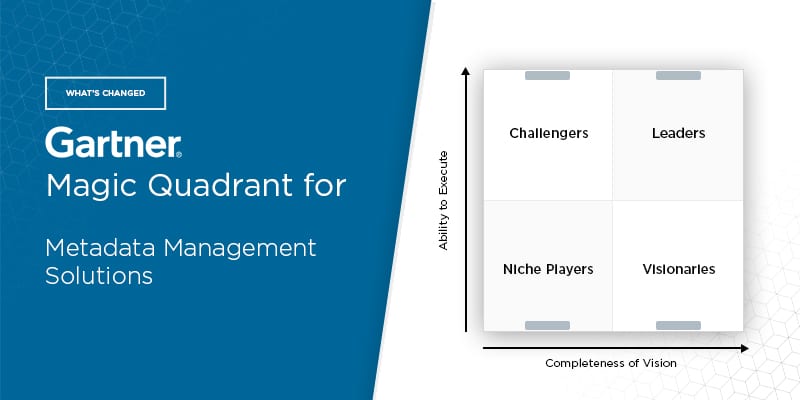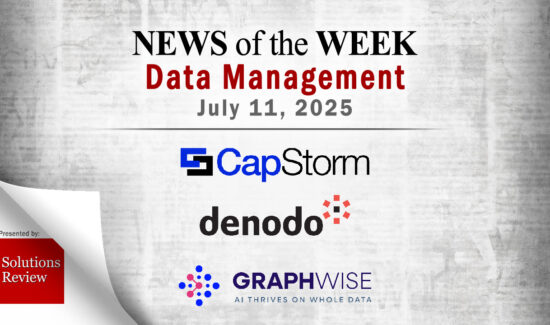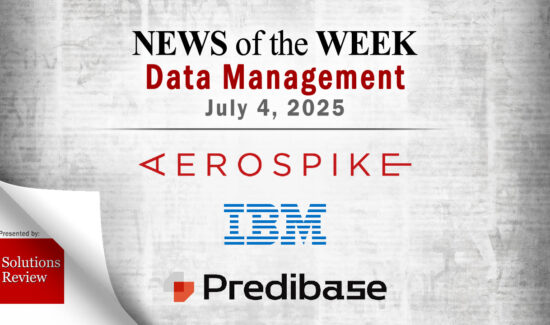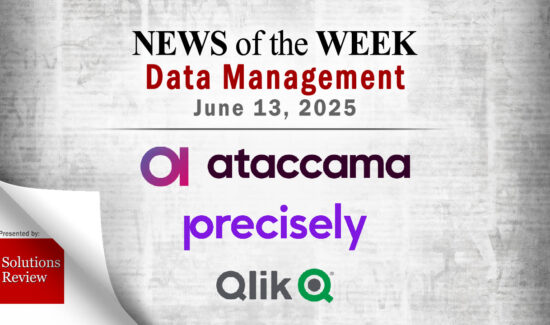What’s Changed: 2019 Gartner Magic Quadrant for Metadata Management Solutions


Analyst house Gartner, Inc. recently released the 2019 version of its Magic Quadrant for Metadata Management Solutions. Gartner defines the software category as “an aspect of an organization’s management of its data and information assets.” Metadata simply summarizes data, which has the ability to make finding and working with relevant information easier. Metadata can be created manually by a user, or automated by a data processing tool. Metadata commonly describes how and when and by whom a particular data set was created and what native format it resides.
Commonly used as a reference for business-centric projects, metadata is instrumental for describing, inventorying and understanding data for multiple use cases. The most common include data governance, risk and compliance, and data analytics. Selecting the best metadata management product can be a difficult task due to the high degree of specialization among vendors in this space. Gartner adds: “The market for metadata management solutions is complex because these solutions are not all identical in scope or capability.”
The solution providers included in this Magic Quadrant offer one or more of the many traditional metadata management capabilities like metadata repositories, a business glossary, data lineage, impact analysis, rules management, semantic frameworks, or metadata ingestion and or translation. Vendors also had to demonstrate to Gartner the ability to identify, document and maintain relationships between ingested and translated metadata to be included. Gartner adds: “the past year has seen all featured vendors working to improve their execution in order to meet requirements arising from data inventory opportunities and regulations.”
The software marketplace for metadata management tools will largely be driven by new and emerging use cases in the short-term, and may shift even further as requirements change. Gartner warns that the space “might diverge” as a result of new capabilities that will put a strain on providers that develop solutions for traditional metadata use cases. The glut of major players in this space, as demonstrated by the leader column of this Magic Quadrant, may mean that the most important differentiators will come through specialization or vertical-specific products.
In this Magic Quadrant, Gartner evaluates the strengths and weaknesses of 17 providers that it considers most significant in the marketplace, and provides readers with a graph (the Magic Quadrant) plotting the vendors based on their ability to execute and their completeness of vision. The graph is divided into four quadrants: niche players, challengers, visionaries, and leaders. At Solutions Review, we read the report, available here, and pulled out the key takeaways.
Gartner adjusts its evaluation and inclusion criteria for Magic Quadrants as software markets evolve. data.world, erwin, Semantic Web Company and Syniti have been added to the report. DATUM is now represented as Infogix as a result of the two vendors merging in October of 2018.
Informatica’s year-long stalemate with Collibra has come to an end as the Redwood City-based provider most known for its data integration product portfolio claimed the top spot. Informatica touts several metadata management solutions, including its Enterprise Data Catalog, Axon, Metadata Management, Business Glossary, and Secure@Source. Informatica’s focus on data governance and analytic enablement make it the clear top choice in enterprise settings. Collibra’s placement among the leaders remains unchanged, with more than 40 percent of Gartner reference customers at least considering it during the vendor evaluation process. Collibra offers a strong focus on business users, as well as market education resources in the form of Collibra University and Collibra Coaching Services.
Smartlogic improved its standing on both axes and now holds the third-best position on Gartner’s visual. Smartlogic’s rise comes on the back of its Semaphore metadata product which has clients in a number of industries. Smartlogic reference customers also scored it well above average across all functionalities, including for modeling, metadata transformation and creation. ASG made a big move along Gartner’s vertical ability to execute axis, slotting in just to the left of Smartlogic. ASG’s Enterprise Data Intelligence (EDI) product features an intuitive interface and an array of capabilities like autodiscovery, cataloging, reference data management, and governance. ASG also offers expansive business use case support.
Infogix’s position among the leaders is buoyed by its product vision for emphasizing data governance to business users. Its Data3Sixty Govern platform offers active metadata features that enable data management. Infogix reference customers mostly use the product for data governance and risk, compliance and data value management. Alation gained a bit of clout in the horizontal axis for completeness of vision and is a staple of the marketplace. Alation has also expanded its partner ecosystem for analytic use cases to include companies like Cloudera, MicroStrategy, Teradata and Tableau Software.
Alex Solutions made a big move from the bottom portion of the leaders column to the centre, and touts what Gartner calls “a fast-evolving solution” that can be used for an array of use cases. Alex reference customers expressed satisfaction for overall user experience, with ease of deployment and integration as two of the top features. Three enterprise software mega-vendors (IBM, Oracle, SAP) call the lower-left of the leadesr bracket home. Though Oracle and IBM retained identical positions to 2018, SAP made the jump from the visionaries column. Its SAP Data Hub product is on the cutting edge of intelligent data management, offering scalable machine learning capabilities.
Like SAP, Adaptive also made a jump from the visionaries column to market leadership status. Adaptive utilizes knowledge graphs and machine learning, and enables customers to position data governance in the context of heterogeneous enterprise architecture. Adaptive also makes use of an expansive partner ecosystem. erwin makes its debut as the final 2019 leader, straddling the line between it and the metadata management visionaries below. erwin offers a combined solution that encompasses its erwin Data Governance, erwin Data Intelligence, erwin Data Literacy, and erwin Data Catalog. erwin imports metadata from data integration platforms and tools via connectors and cloud-based offerings.
Syniti is another newcomer to this Magic Quadrant. Its debut position as a market visionary is an impressive one. The Boston-based vendor formerly known as BackOffice Associates is just a stone’s throw from market leadership. Syniti Information Management offers a combination of software and services focused on incremental, data-experience-based delivery. The product uses metadata to identify gaps in an organization’s overall data management. Semantic Web Company’s PoolParty Semantic Suite ingests metadata for analysis and utilization and uses a combination of a graph analytics engine, natural language processing and traditional gap analysis to infer missing metadata points. Semantic also features some of the best service and support options in the space, and documentation and technical support is well directed.





















